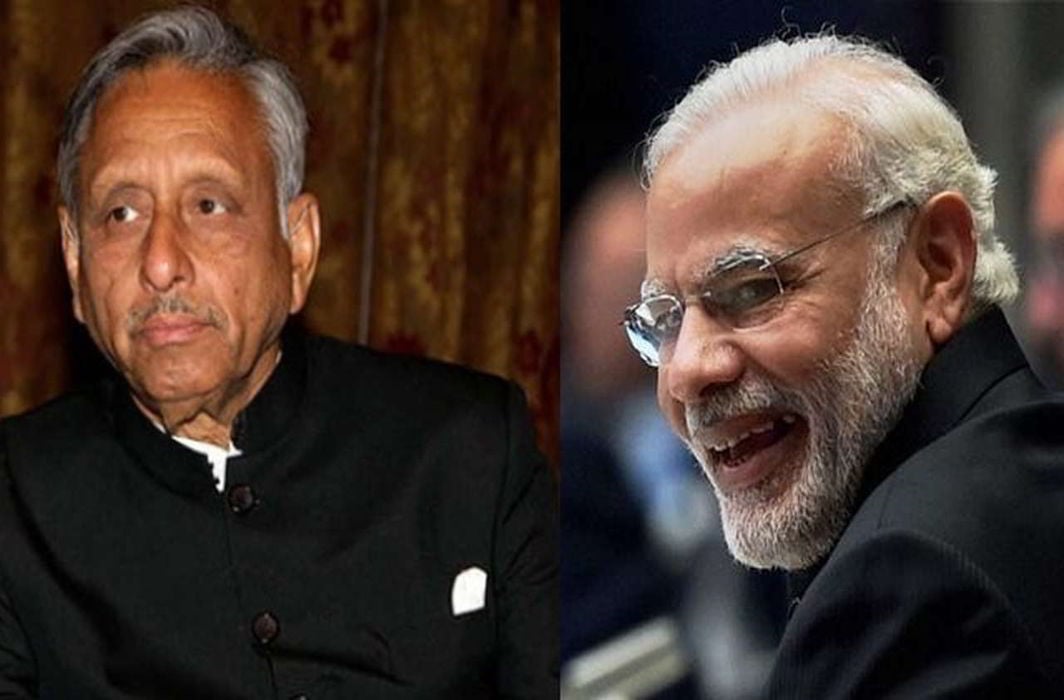[vc_row][vc_column][vc_column_text]
Congress leaders believe Aiyar’s comment has given the BJP and Prime Minister Narendra Modi the much needed edge in Gujarat assembly polls
Struggling to undo the definite political damage that his ‘neech aadmi’ jibe at Prime Minister Narendra Modi is expected to cause the Congress party’s bid to a lead over the BJP in the upcoming Gujarat assembly polls, the Congress has suspended Mani Shankar Aiyar from the party’s primary membership.
The Congress party’s decision against its veteran leader and Nehru-Gandhi loyalist came late on Thursday night after desperate attempts by party vice president Rahul Gandhi and other leaders to distance themselves from Aiyar failed to check the BJP from launching an offensive. Aiyar’s convoluted apology over the remark which came only after a curt tweet by Rahul Gandhi asked him to do so had no effect on the BJP which zealously attacked the Congress for a remark which it claimed was “filthy, classist and derogatory”.
[/vc_column_text][/vc_column][/vc_row][vc_row][vc_column][vc_raw_html]JTNDYmxvY2txdW90ZSUyMGNsYXNzJTNEJTIydHdpdHRlci10d2VldCUyMiUyMGRhdGEtbGFuZyUzRCUyMmVuJTIyJTNFJTNDcCUyMGxhbmclM0QlMjJoaSUyMiUyMGRpciUzRCUyMmx0ciUyMiUzRSVFMCVBNCVBRiVFMCVBNCVCOSVFMCVBNSU4MCUyMCVFMCVBNCVCOSVFMCVBNSU4OCVFMCVBNCU4MiUyMCVFMCVBNCU5NSVFMCVBNCVCRSVFMCVBNCU4MiVFMCVBNCU5NyVFMCVBNSU4RCVFMCVBNCVCMCVFMCVBNSU4NyVFMCVBNCVCOCUyMCVFMCVBNCU5NSVFMCVBNCVCRSUyMCVFMCVBNCU5NyVFMCVBNCVCRSVFMCVBNCU4MiVFMCVBNCVBNyVFMCVBNSU4MCVFMCVBNCVCNSVFMCVBNCVCRSVFMCVBNCVBNiVFMCVBNSU4MCUyMCVFMCVBNCVBOCVFMCVBNSU4NyVFMCVBNCVBNCVFMCVBNSU4MyVFMCVBNCVBNCVFMCVBNSU4RCVFMCVBNCVCNSUyMCVFMCVBNCVCNSUyMCVFMCVBNCVCNSVFMCVBNCVCRiVFMCVBNCVCMCVFMCVBNSU4QiVFMCVBNCVBNyVFMCVBNSU4MCUyMCVFMCVBNCU5NSVFMCVBNSU4NyUyMCVFMCVBNCVBQSVFMCVBNSU4RCVFMCVBNCVCMCVFMCVBNCVBNCVFMCVBNCVCRiUyMCVFMCVBNCVCOCVFMCVBNCVBRSVFMCVBNSU4RCVFMCVBNCVBRSVFMCVBNCVCRSVFMCVBNCVBOCUyMCVFMCVBNCU5NSVFMCVBNSU4MCUyMCVFMCVBNCVBRCVFMCVBNCVCRSVFMCVBNCVCNSVFMCVBNCVBOCVFMCVBNCVCRSVFMCVBNSVBNCUzQ2JyJTNFJTNDYnIlM0UlRTAlQTQlOTUlRTAlQTQlQkUlRTAlQTQlODIlRTAlQTQlOTclRTAlQTUlOEQlRTAlQTQlQjAlRTAlQTUlODclRTAlQTQlQjglMjAlRTAlQTQlQUElRTAlQTQlQkUlRTAlQTQlQjAlRTAlQTUlOEQlRTAlQTQlOUYlRTAlQTUlODAlMjAlRTAlQTQlQTglRTAlQTUlODclMjAlRTAlQTQlQjYlRTAlQTUlOEQlRTAlQTQlQjAlRTAlQTUlODAlMjAlRTAlQTQlQUUlRTAlQTQlQTglRTAlQTUlODAlMjAlRTAlQTQlQjYlRTAlQTQlODIlRTAlQTQlOTUlRTAlQTQlQjAlMjAlRTAlQTQlODUlRTAlQTQlQUYlRTAlQTUlOEQlRTAlQTQlQUYlRTAlQTQlQjAlMjAlRTAlQTQlOTUlRTAlQTUlOEIlMjAlRTAlQTQlOTUlRTAlQTQlQkUlRTAlQTQlQjAlRTAlQTQlQTMlMjAlRTAlQTQlQUMlRTAlQTQlQTQlRTAlQTQlQkUlRTAlQTQlOTMlMjAlRTAlQTQlQTglRTAlQTUlOEIlRTAlQTQlOUYlRTAlQTQlQkYlRTAlQTQlQjglMjAlRTAlQTQlOUMlRTAlQTQlQkUlRTAlQTQlQjAlRTAlQTUlODAlMjAlRTAlQTQlOTUlRTAlQTQlQjAlMjAlRTAlQTQlQUElRTAlQTUlOEQlRTAlQTQlQjAlRTAlQTQlQkUlRTAlQTQlQTUlRTAlQTQlQUUlRTAlQTQlQkYlRTAlQTQlOTUlMjAlRTAlQTQlQjglRTAlQTQlQTYlRTAlQTQlQjglRTAlQTUlOEQlRTAlQTQlQUYlRTAlQTQlQTQlRTAlQTQlQkUlMjAlRTAlQTQlQjglRTAlQTUlODclMjAlRTAlQTQlQTglRTAlQTQlQkYlRTAlQTQlQjIlRTAlQTQlQUUlRTAlQTUlOEQlRTAlQTQlQUMlRTAlQTQlQkYlRTAlQTQlQTQlMjAlRTAlQTQlOTUlRTAlQTQlQjAlMjAlRTAlQTQlQTYlRTAlQTQlQkYlRTAlQTQlQUYlRTAlQTQlQkUlMjAlRTAlQTQlQjklRTAlQTUlODglRTAlQTUlQTQlM0NiciUzRSUzQ2JyJTNFJUUwJUE0JTk1JUUwJUE1JThEJUUwJUE0JUFGJUUwJUE0JUJFJTIwJUUwJUE0JUFFJUUwJUE1JThCJUUwJUE0JUE2JUUwJUE1JTgwJTIwJUUwJUE0JTlDJUUwJUE1JTgwJTIwJUUwJUE0JTk1JUUwJUE0JUFEJUUwJUE1JTgwJTIwJUUwJUE0JUFGJUUwJUE0JUI5JTIwJUUwJUE0JUI4JUUwJUE0JUJFJUUwJUE0JUI5JUUwJUE0JUI4JTIwJUUwJUE0JUE2JUUwJUE0JUJGJUUwJUE0JTk2JUUwJUE0JUJFJUUwJUE0JThGJUUwJUE0JTgxJUUwJUE0JTk3JUUwJUE1JTg3JTNGJTIwJTNDYSUyMGhyZWYlM0QlMjJodHRwcyUzQSUyRiUyRnQuY28lMkZoNk1FZ3ZtNkNhJTIyJTNFaHR0cHMlM0ElMkYlMkZ0LmNvJTJGaDZNRWd2bTZDYSUzQyUyRmElM0UlM0MlMkZwJTNFJTI2bWRhc2glM0IlMjBSYW5kZWVwJTIwUyUyMFN1cmpld2FsYSUyMCUyOCU0MHJzc3VyamV3YWxhJTI5JTIwJTNDYSUyMGhyZWYlM0QlMjJodHRwcyUzQSUyRiUyRnR3aXR0ZXIuY29tJTJGcnNzdXJqZXdhbGElMkZzdGF0dXMlMkY5Mzg3ODk0MzM0NjkzMTMwMjQlM0ZyZWZfc3JjJTNEdHdzcmMlMjU1RXRmdyUyMiUzRURlY2VtYmVyJTIwNyUyQyUyMDIwMTclM0MlMkZhJTNFJTNDJTJGYmxvY2txdW90ZSUzRSUwQSUwQSUzQ3NjcmlwdCUyMGFzeW5jJTIwc3JjJTNEJTIyaHR0cHMlM0ElMkYlMkZwbGF0Zm9ybS50d2l0dGVyLmNvbSUyRndpZGdldHMuanMlMjIlMjBjaGFyc2V0JTNEJTIydXRmLTglMjIlM0UlM0MlMkZzY3JpcHQlM0U=[/vc_raw_html][/vc_column][/vc_row][vc_row][vc_column][vc_column_text]
Aiyar’s comment comes as just the kind of ammunition that Prime Minister Narendra Modi and his BJP would have hoped to attack the Congress with at a time when the Grand Old Party seemed to be making definite strides towards regaining political ground in Gujarat, a state where the saffron party has ruled for nearly 22 consecutive years.
The Congress, according to some opinion polls, was steadily reviving its electoral fortunes in the state and was pegged to give the BJP a tough fight in the battle for Gujarat. However, Aiyar’s statement comes as the third major gaffe by Congress leaders with regard to the Gujarat.
First, the Twitter handle of Yuva Desh, a magazine published by the youth wing of the Congress party had put out a meme mocking Narendra Modi for his ‘chaiwala’ past. The BJP has pounced on the opportunity and claimed that it reflected the Congress’ disgust for the poor. The Congress promptly withdrew the meme and issued an apology.
Then, just as the storm over the tweet seemed to be over, senior Congress leader Kapil Sibal appeared in the Supreme Court on behalf of a petitioner in the Babri Masjid-Ram Janmbhoomi title suit and demanded that the top court postpone its hearing of the controversial case till July 2019 – something that the Supreme Court stridently denied even as it adjourned the matter till February 8. Modi immediately lapped up Sibal’s comments and told the Gujarat electorate that the Congress leader was acting on behalf of his party and its vice president Rahul Gandhi to delay a settlement on the Ram Mandir issue, while claiming that the Sunni Waqf Board that Sibal was appearing on behalf of had claimed that it did not ask the lawyer to demand postponement of the hearing. Modi even congratulated the Sunni Waqf Board for its stand on Sibal.
As Sibal was busy clarifying that he had not appeared on behalf of the Sunni Waqf Board but for a private petitioner in the case and that he was not acting on behalf of the Congress party but as a professional lawyer, Aiyar launched his ‘neech aadmi’ broadside at Modi.
Expectedly, all hell broke loose over Aiyar’s statement. It made matters worse that Aiyar is the same Congress leader who had in the run up to the 2014 Lok Sabha campaign derided Modi for his ‘chaiwala’ past – his comments were seen among the key reasons that propelled the Congress to its historic defeat in the general elections.
Unfortunately for the Congress, Aiyar’s comments have come at a time when his party will have little opportunity of changing the narrative that Modi and the BJP have now taken the Gujarat election campaign to – that of the Congress being classist and anti-poor. Aiyar made the obnoxious statement on the last day of campaigning for the first phase of the Gujarat polls. This means that it could have significant adverse impact not only in the voting pattern for the first phase of the state election, due on Saturday, but also become the dominant campaign issue for the BJP and Modi in the run up to the second phase polling that is scheduled for December 14.
Rahul Gandhi, who is leading his party’s campaign against the BJP in Gujarat, is desperately trying to carry on with the narrative he had sought to build for his party’s campaign against the BJP in the state. He is posing hard questions at the state of Gujarat’s poor, unemployment in the state, farmers’ concerns, autocratic rule of Modi and Gujarat chief minister Vijay Rupani and a host of other issues. But given Modi’s expertise in giving even the most obtuse comments of the Congress – irrespective of apologies over them being issued by the Grand Old Party – a spin, often a communally divisive one which benefits the BJP, it seems that the Congress has handed over victory to the BJP once again in the state.
The situation, as Congress leaders admit unofficially, is akin to the row kicked up by Modi when Congress president Sonia Gandhi had called him a ‘maut ka saudagar’ in the Gujarat election campaign a decade ago while attacking the then Gujarat chief minister for his alleged role in the 2002 post-Godhra riots.
[/vc_column_text][/vc_column][/vc_row]


 India News19 hours ago
India News19 hours ago
 Latest world news19 hours ago
Latest world news19 hours ago
 Latest world news5 hours ago
Latest world news5 hours ago
 Latest world news4 hours ago
Latest world news4 hours ago
 India News4 hours ago
India News4 hours ago
 Latest world news4 hours ago
Latest world news4 hours ago
 India News4 hours ago
India News4 hours ago



